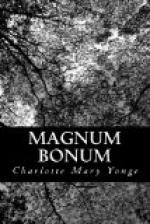“Never before.” That was the burthen of the song of the little bird with wounded wing who had been received into this nest. She had the dimmest remembrance of home or mother, something a little clearer of her sojourn at her aunt’s, though there the aunt had been an invalid who kept her in restraint in her presence, and her pleasures had been in the kitchen and in a few books, probably ‘Don Quixote’ and ‘Evelina,’ so far as could be gathered from her recollection of them. The week her father had spent with her, before his last voyage, had been the one vivid memory of her life, and had taught her at least how to love. Poor child, that happy week had had to serve her ever since, through eleven years of unbroken school! Not that she pitied herself. Everybody had been kind to her-governesses, masters, girls, and all. She had been happy and successful, and had made numerous friends, about whom, as she grew more at home, she freely chatted to Mrs. Brownlow, who was always ready to hear of Mary Ogilvie and Clara Cartwright, and liked to draw out the stories of the girl-world, in which it was plain that Caroline Allen had been a bright, good, clever girl, getting on well, trusted and liked. She had been half sorry to leave her dear old school, half glad to go on to something new. She was evidently not so comfortable, while Miss Heath’s lowest teacher, as she had been while she was the asylum’s senior pupil. Yet when on Sunday evening the Doctor was summoned and the ladies were left tete-a-tete, she laughed rather than complained. But still she owned, with her black head on Mrs. Brownlow’s lap, that she had always craved for something-something, and she had found it now!
Everything was a fresh joy to her, every print on the walls, every ornament on the brackets, seemed to speak to her eye and to her soul both at once, and the sense of comfort and beauty and home, after the bareness of school, seemed to charm her above all. “I always did want to know what was inside people’s windows,” she said.
And in the same way it was a feast to her to get hold of “a real book,” as she called it, not only the beginnings of everything, and selections that always broke off just as she began to care about them. She had been thoroughly well grounded, and had a thirst for knowledge too real to have been stifled by the routine she had gone through-though, said she, “I do want time to get on further, and to learn what won’t be of any use!”
“Of no use!” said Mr. Brownlow laughing-having just found her trying to make out the Old English of King Alfred’s ’Boethius’-"such as this?”
“Just so! They always are turning me off with ’This won’t be of any use to you.’ I hate use-”
“Like Ridley, who says he reads a book with double pleasure if he is not going to review it.”
“That Mr. Ridley who came in last evening?”
“Even so. Why that opening of eyes?”
“I thought a critic was a most formidable person.”




